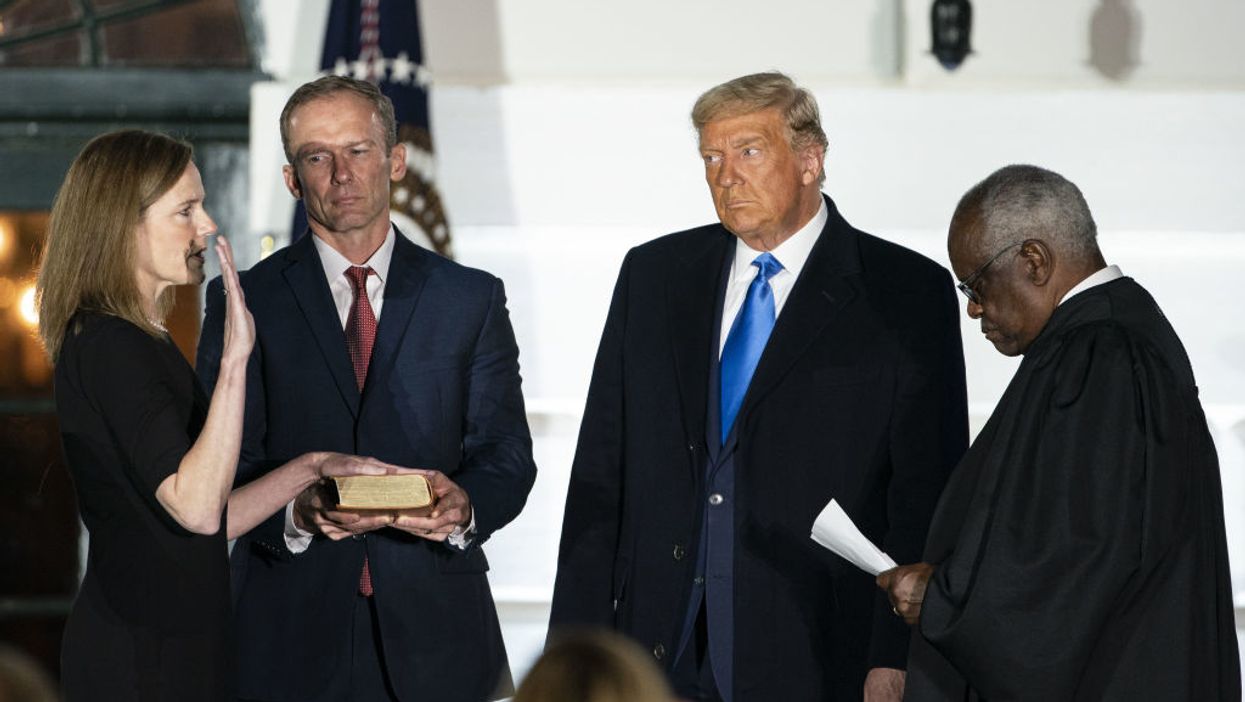
Al Drago/Bloomberg via Getty Images

The newly installed justice begins her SCOTUS career with the most divisive issue the modern court could consider
The Supreme Court will deliberate Friday on whether it will review a Mississippi pro-life law that bans abortion after an unborn child's heartbeat can be detected.
If the Supreme Court takes the case, it will be the first potential challenge to Roe v. Wade's precedent to come before the court with newly installed Associate Justice Amy Coney Barrett hearing the arguments.
Mississippi Attorney General Lynn Fitch petitioned the court last week to review the state's 15-week abortion ban, asking the court to clarify how lower courts should interpret a previous Supreme Court decision striking down a Louisiana pro-life law, CBS News reported. He cited several opinions from federal appeals court judges that varied in their reasoning on separate abortion-related cases, some citing the Supreme Court's majority opinion from Medical Services v. Russo to strike down restrictions on abortion, others referring to Chief Justice John Roberts' concurring opinion to keep those regulations in place.
"This case remains an ideal vehicle to promptly resolve both that question and the first question presented — the contradictions in this Court's decisions over use of 'viability' as a bright line for measuring pro-life legislation," Fitch wrote in a supplemental brief sent to the Supreme Court.
The case asks the court to decide "whether all pre-viability prohibitions on elective abortions are unconstitutional," taking direct aim at the heart of the Roe v. Wade decision, which legalized abortion before fetal viability at 24 weeks nationally.
The lawyer for the pro-choice group challenging Mississippi's heartbeat law told CBS News the law explicitly violates Roe's precedent.
"Mississippi's 15-week abortion ban defies nearly fifty years of Supreme Court precedent," Hillary Schneller, the staff attorney at the Center for Reproductive Rights, told CBS News. "Mississippi's abortion ban, by definition, is a complete and insurmountable obstacle for pregnant people seeking abortion care after 15 weeks."
On Friday, the nine justices of the Supreme Court will meet to discuss and vote on whether they will hear this case and others. Four justices must agree to take the case before the Supreme Court will hear the arguments. An announcement on the Supreme Court's decision is expected to come Monday.
All eyes are on newly confirmed Justice Amy Coney Barrett as the court weighs this decision. Progressives fear and conservatives hope that Barrett's addition to the court has cemented a 6-3 originalist-leaning majority that will overturn Roe, ending the national legalization of abortion and sending the issue back to the states.
The last abortion-related case to come before the court was Medical Services v. Russo, in which a 5-4 majority blocked a Louisiana law that required abortionists to have admitting privileges at a nearby hospital. Chief Justice John Roberts joined the four progressives on the court in a concurring opinion, saying that while he disagrees with prior rulings declaring such restrictions unconstitutional, the court is bound by precedent.
Multiple senators questioned Barrett on the role of Supreme Court precedent during her confirmation hearings, with Democrats attempting to have her clarify her views on Roe in particular. Barrett, following Justice Ruth Bader Ginsburg's example, refused to give her opinion on Roe v. Wade's precedent, noting that there were pending cases before the court system challenging aspects of Roe and that it would be unethical for her to signal to potential litigants how she might rule.
During one exchange with Sen. Amy Klobuchar (D-Minn.), however, Barrett did not list Roe among several cases she called "super-precedents" that the court cannot overturn because they are established law. An example of one such case would be Brown v. Board of Education, the 1954 court ruling that declared "separate is not equal," ending racial segregation in public schools.
She didn't tip her cards, though, deftly answering Klobuchar's questions in a way that left her position on Roe's precedent ambiguous.
"Roe is not a super-precedent because calls for its overruling have never ceased, but that doesn't mean that Roe should be overruled," Barrett explained.
Other pending cases the Supreme Court may consider are whether a New York prosecutor will get access to President Donald Trump's financial information and election-related cases.